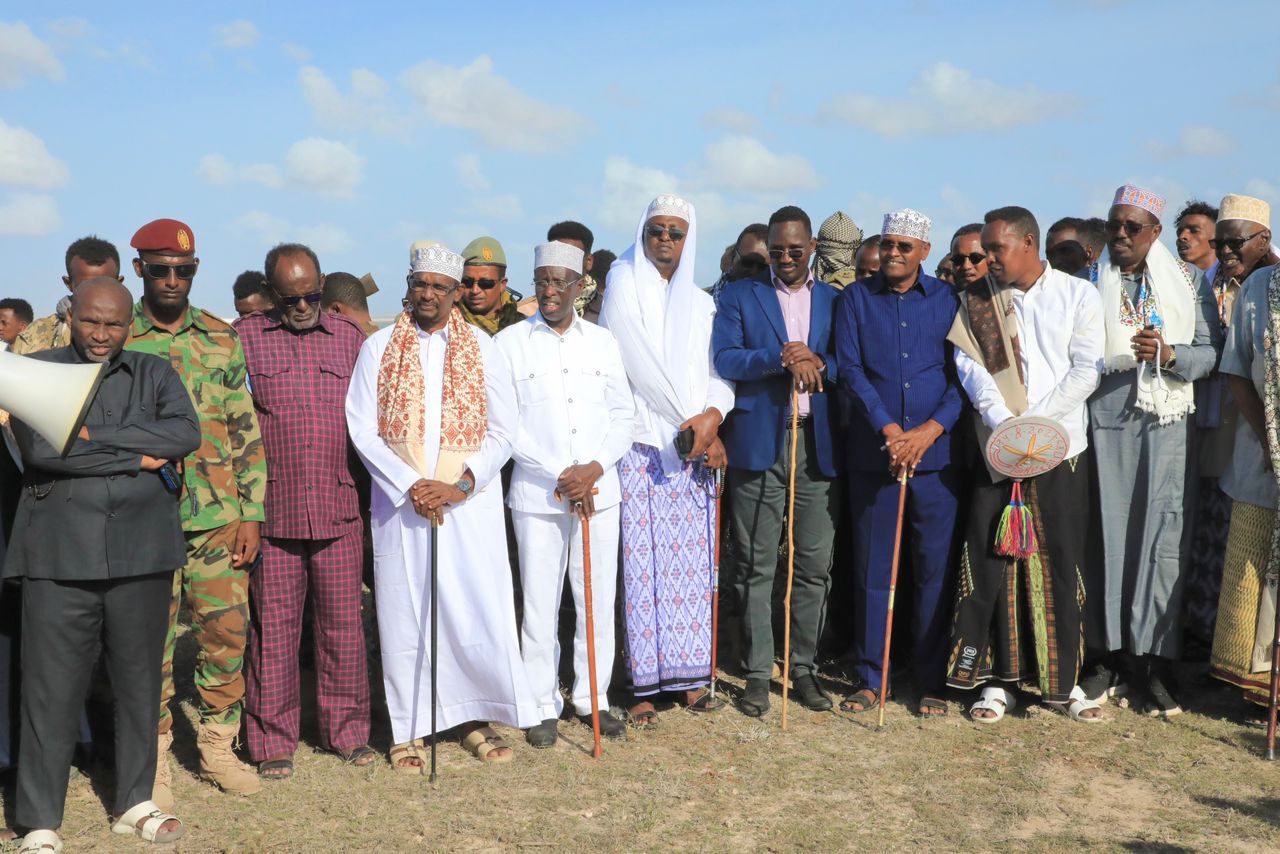
Milestone for Somalia Peace: Clans End Deadly Conflict in Middle Shabelle
|
22 August 2024 21:34

JOWHAR, Somalia (HORN OBSERVER) – A pivotal step toward lasting peace in Somalia was achieved on August 15, 2024, with the formal signing of a peace agreement between the Abdalla Carone and Mohamed Muse clans in the Middle Shabelle region.

This agreement marks the end of a deadly conflict that has deeply scarred local communities, offering a new chapter of hope and reconciliation.
The clan conflicts in Somalia have left a profound and devastating impact on its people, triggering a cycle of violence and destruction that has disrupted the country’s social fabric. These inter-clan battles, rooted in long-standing grievances, have resulted in countless deaths, the displacement of entire communities, and the decimation of vital infrastructure.
The ongoing conflict has crippled Somalia’s economy, forcing its people to live in constant fear and uncertainty. Everyday activities such as trade, travel, and social interactions have been paralyzed, while thousands of displaced individuals endure harsh conditions with limited access to essential services like food, clean water, and healthcare.
Successive Somali governments have struggled to address the deep-seated animosities between clans. The lack of sustained efforts to reconcile these feuding groups has perpetuated a cycle of violence that has hindered the country’s progress, undermined peace initiatives, and posed a severe threat to national unity and statehood. Middle Shabelle has been one of the regions most affected by these conflicts, where simmering tensions between neighboring clans have repeatedly erupted into deadly violence.
In July of the previous year, former Somali President Sharif Sheikh Ahmed undertook the formidable task of resolving a particularly intense conflict that had flared up in the Cadalle and Raage Ceelle districts of Middle Shabelle. This violent clash claimed the lives of 25 young men and led to the destruction of homes and markets, the displacement of numerous families, and the disruption of local trade. Accompanied by Imam Daahir Mahamud and Ugaas Mahamud Ali Ugaas, two prominent traditional leaders from the Mudullood clan, President Sharif launched a peace mission to halt the bloodshed among his countrymen.
Upon reaching the conflict zones, Sharif Sheikh Ahmed successfully negotiated a ceasefire, disbanded the warring militias, facilitated the return of displaced families, and initiated peace talks in the Burka Dirin area. However, despite these initial successes, the situation remained fragile. Recognizing the need for a more robust security presence, President Sharif requested the deployment of national forces to Middle Shabelle to apprehend the armed militias responsible for targeted killings in the region. These forces played a crucial role in quelling conflicts in various areas, leading to the arrest of hundreds involved in orchestrating the violence.
The peace efforts at Burka Dirin extended over a challenging 13-month period, during which President Sharif remained in Dirin—a remote area lacking basic services like electricity, communication, and clean water. His prolonged presence there underscored his deep commitment to peace and his determination to end the cycle of violence that had plagued the region.
Despite numerous challenges, including political interference and attempts by Al-Shabaab to incite further violence, a breakthrough was finally achieved with the peace agreement between the Abdalla Carone and Mohamed Muse clans. This agreement has had a profound impact on the lives of local residents, offering a glimmer of hope for a more peaceful future.
At the conclusion of the peace talks, elders who had witnessed the devastation emphasized the urgent need for peace and reflected on the destructive consequences of continued conflict through poetry.
Speaking at the closing ceremony, Sharif Sheikh Ahmed expressed his gratitude for the progress made, stating, "We thank God for reaching this point. It has not been a simple task, but I want to thank everyone who contributed to ending this conflict.”
He acknowledged the deep divisions that the conflict had sown within communities and the hardships it had caused.
"The killing of people and looting are the two serious crimes that led to this clan conflict. The armed men who commit these killings must be held accountable and stopped,” he added, urging an end to rhetoric based on clan incitement.

The two leading elders of the Abgaal clans, Imam Daahir Mahamud and Ugaas Mahamud Ali Ugaas, issued a stern warning at the ceremony, declaring that any future conflicts between these clans would invoke the curse of tradition and the blood of the two animals sacrificed during the reconciliation process.
"We state that this is the end of the conflict. We want all sides to respect the peace agreement. From today, every person who commits revenge killings will be brought to the full force of the law,” said Imam Daahir.
Ugaas Mahamud echoed this sentiment, calling for unity against any further violence.
With the conflict between the Mohamed Muse and Abdalla Carone clans now resolved, efforts are set to begin this week to address the eight-year-long conflict between the Celi and Abdalla Carone clans and others.
President Sharif Sheikh Ahmed has urged the reconciled clans to uphold peace and work toward coexistence, emphasizing that the future of Somalia depends on the willingness of its people to set aside their differences and build a unified, peaceful nation.
Leave a comment
- Popular
- Rated
- Commented
04/11/2021 - 11:05:02
28/05/2024 - 15:44:10
02/12/2021 - 11:34:53
01/03/2021 - 09:00:37
Opinions
02/04/2025 - 18:34:53
27/02/2025 - 20:18:23
Politics
17/04/2025 - 01:58:17
13/04/2025 - 10:59:05
Terror Watch
26/04/2025 - 03:43:22
24/04/2025 - 13:30:44
24/04/2025 - 13:07:46
Press Releases
28/04/2025 - 18:24:22
 0
0 




































Milestone for Somalia Peace: Clans End Deadly Conflict in Middle Shabelle
JOWHAR, Somalia (HORN OBSERVER) – A pivotal step toward lasting peace in Somalia was achieved on August 15, 2024, with the formal signing of a peace agreement between the Abdalla Carone and Mohamed Muse clans in the Middle Shabelle region.